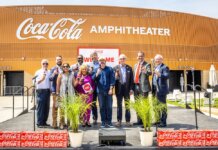
Country superstar Alan Jackson famously sings, “Way down yonder on the Chattahoochee,” reminiscing about learning how to swim, how to love and, yes, how to drink, all on the river that serves as the state line between Phenix City, Alabama, and Columbus, Georgia.
Jackson’s Chattahoochee, which he wrote about in 1993, is a far cry from the Chattahoochee of today, which in October hosted the Kayak Freestyle World Championships.
“Who would ever have thought that that would be in Alabama?” Dan Gilbert asks.
Gilbert is president of Atlanta-based Whitewater Express, which is the operator of what it calls the longest urban whitewater course in the world.
Specifically, that’s the two-and-a-half miles of rapids twisting and turning through Phenix City and Columbus, bringing life (and people) back to a river that had been dammed up since the 1800s.
“The dams made for a very stagnant, unhealthy river, but in about 2010, a bunch of entities had put in about $40 million to bring the river back to health,” Gilbert says. With the infusion of money, the dams were blown up, and rapids were built to create a whitewater course.
“We opened Memorial Day 2012,” says Gilbert, whose company has held the license for whitewater operations in Phenix City and Columbus for a decade and has just renewed for another 10 years.
For the first couple of years, Gilbert says, visitors to the area were almost all local. Slowly but surely, though, word began to spread that the water at Phenix City was well worth a road trip, whether you were a canoeing novice or a world-class kayaker.
“Now, about 90% of our people come from more than an hour away,” says Gilbert, who says about 50,000 people yearly visit the area. “It’s become a regional destination, and it has had a big impact on the community.”

That success goes beyond people reserving hotel rooms and eating at local restaurants. It’s a source of community pride, Gilbert says.
“What they wanted was to give the city a new spark, which it has done,” he says. “It’s not just people coming to town bringing in money. The people living here really enjoy their town more than they used to. They enjoy seeing tourists come to town. People will bring chairs and lunch and watch the rafters going down the river.
“What’s happened in Phenix City is really being watched by cities all over the country,” Gilbert adds. “About once a month, we have someone come from somewhere else to see what’s happened here and see if they can replicate it.”
Phenix City’s reputation has continued to spread, and Gilbert and others have welcomed the spotlight. About eight years ago, Gilbert says, a group of Canadian kayakers in Phenix City turned out to be the Canadian freestyle kayaking team, thrilled to have found a warm climate to train in.
“They said if they were back at home, they’d be in the snow and ice,” Gilbert says. “These elite athletes have to train year-round. There are two places in the world that people have gone for that training. Previously, they’d been going to the Nile River, because it’s got a good wave, and it’s warm. But they’ve covered a lot of that up … We’re the go-to place in the wintertime now.”
Traveling athletes can stay for free on a piece of property next to the river, and they have use of a hospitality room with internet, cable TV, showers and a restroom. “They come from France, Canada, all over the world in the wintertime, just to train where it’s warm,” Gilbert says.
Gilbert says that hospitality helped Phenix City and Columbus land the Kayak Freestyle World Championships. “We had all these kayakers from all over the world who had visited and said these waves are terrific,” he says.
Though the course in Phenix City and Columbus is shorter than most – the Ocoee in Georgia is five miles and the Nantahala in North Carolina is nine miles – “the difference is we have more intensive waves during that two-and-a-half miles,” Gilbert says.
Gilbert’s team not only teaches kayaking and has guided tours down the river, zip lining has been added along the banks of the Chattahoochee. “It’s a beautiful canopy tour that will stand up against most in the country,” he says.
Shaun Culligan, economic development manager for Phenix City, acknowledges the whitewater industry has been a “game-changer” for his community.
“The culture that has been created around this water sport has been fun to watch,” he says. “The sky is the limit when it comes to future development around rafting, kayaking, zip lining, climbing, etc., and we are working hard to support riverfront development as it helps to drive more and more people downtown and to the river.”
It’s also bringing the communities of Phenix City and Columbus closer together, says Gilbert, who says he’s noticed a lessening of the divide that was evident when he first started visiting the area.
“The river has been that thing that has brought the cities together,” Gilbert says. “It really feels like one community. It has given the two cities a common bond, a common thing to work with and a common thing to have fun with. I think it has made a tremendous difference.”
Alec Harvey is the Birmingham-based executive editor of Business Alabama.
This article appears in the December 2023 issue of Business Alabama.



